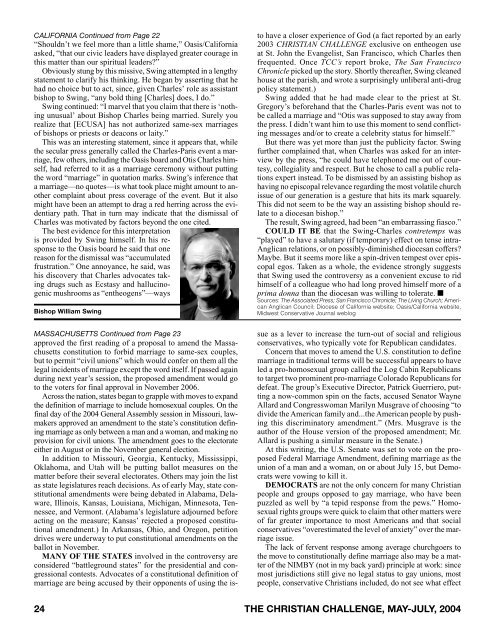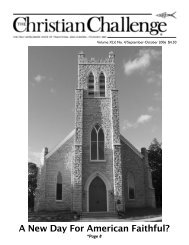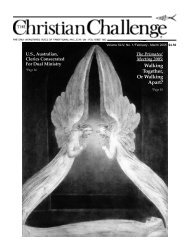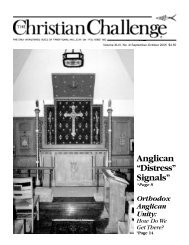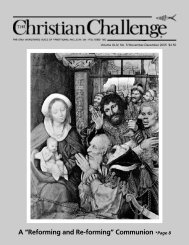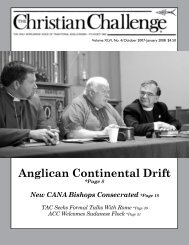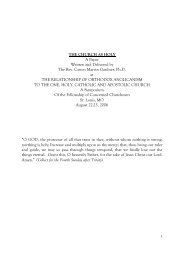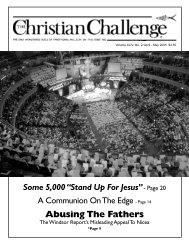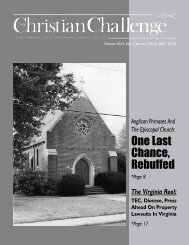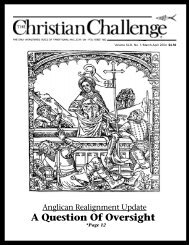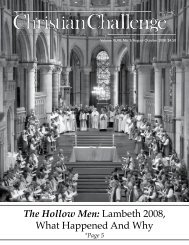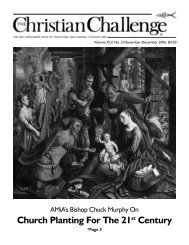MayJune04 Challenge - The Christian Challenge
MayJune04 Challenge - The Christian Challenge
MayJune04 Challenge - The Christian Challenge
You also want an ePaper? Increase the reach of your titles
YUMPU automatically turns print PDFs into web optimized ePapers that Google loves.
CALIFORNIA Continued from Page 22<br />
“Shouldn’t we feel more than a little shame,” Oasis/California<br />
asked, “that our civic leaders have displayed greater courage in<br />
this matter than our spiritual leaders?”<br />
Obviously stung by this missive, Swing attempted in a lengthy<br />
statement to clarify his thinking. He began by asserting that he<br />
had no choice but to act, since, given Charles’ role as assistant<br />
bishop to Swing, “any bold thing [Charles] does, I do.”<br />
Swing continued: “I marvel that you claim that there is ‘nothing<br />
unusual’ about Bishop Charles being married. Surely you<br />
realize that [ECUSA] has not authorized same-sex marriages<br />
of bishops or priests or deacons or laity.”<br />
This was an interesting statement, since it appears that, while<br />
the secular press generally called the Charles-Paris event a marriage,<br />
few others, including the Oasis board and Otis Charles himself,<br />
had referred to it as a marriage ceremony without putting<br />
the word “marriage” in quotation marks. Swing’s inference that<br />
a marriage—no quotes—is what took place might amount to another<br />
complaint about press coverage of the event. But it also<br />
might have been an attempt to drag a red herring across the evidentiary<br />
path. That in turn may indicate that the dismissal of<br />
Charles was motivated by factors beyond the one cited.<br />
<strong>The</strong> best evidence for this interpretation<br />
is provided by Swing himself. In his response<br />
to the Oasis board he said that one<br />
reason for the dismissal was “accumulated<br />
frustration.” One annoyance, he said, was<br />
his discovery that Charles advocates taking<br />
drugs such as Ecstasy and hallucinogenic<br />
mushrooms as “entheogens”—ways<br />
Bishop William Swing<br />
to have a closer experience of God (a fact reported by an early<br />
2003 CHRISTIAN CHALLENGE exclusive on entheogen use<br />
at St. John the Evangelist, San Francisco, which Charles then<br />
frequented. Once TCC’s report broke, <strong>The</strong> San Francisco<br />
Chronicle picked up the story. Shortly thereafter, Swing cleaned<br />
house at the parish, and wrote a surprisingly unliberal anti-drug<br />
policy statement.)<br />
Swing added that he had made clear to the priest at St.<br />
Gregory’s beforehand that the Charles-Paris event was not to<br />
be called a marriage and “Otis was supposed to stay away from<br />
the press. I didn’t want him to use this moment to send conflicting<br />
messages and/or to create a celebrity status for himself.”<br />
But there was yet more than just the publicity factor. Swing<br />
further complained that, when Charles was asked for an interview<br />
by the press, “he could have telephoned me out of courtesy,<br />
collegiality and respect. But he chose to call a public relations<br />
expert instead. To be dismissed by an assisting bishop as<br />
having no episcopal relevance regarding the most volatile church<br />
issue of our generation is a gesture that hits its mark squarely.<br />
This did not seem to be the way an assisting bishop should relate<br />
to a diocesan bishop.”<br />
<strong>The</strong> result, Swing agreed, had been “an embarrassing fiasco.”<br />
COULD IT BE that the Swing-Charles contretemps was<br />
“played” to have a salutary (if temporary) effect on tense intra-<br />
Anglican relations, or on possibly-diminished diocesan coffers?<br />
Maybe. But it seems more like a spin-driven tempest over episcopal<br />
egos. Taken as a whole, the evidence strongly suggests<br />
that Swing used the controversy as a convenient excuse to rid<br />
himself of a colleague who had long proved himself more of a<br />
prima donna than the diocesan was willing to tolerate. ■<br />
Sources: <strong>The</strong> Associated Press; San Francisco Chronicle; <strong>The</strong> Living Church; American<br />
Anglican Council; Diocese of California website; Oasis/California website,<br />
Midwest Conservative Journal weblog<br />
MASSACHUSETTS Continued from Page 23<br />
approved the first reading of a proposal to amend the Massachusetts<br />
constitution to forbid marriage to same-sex couples,<br />
but to permit “civil unions” which would confer on them all the<br />
legal incidents of marriage except the word itself. If passed again<br />
during next year’s session, the proposed amendment would go<br />
to the voters for final approval in November 2006.<br />
Across the nation, states began to grapple with moves to expand<br />
the definition of marriage to include homosexual couples. On the<br />
final day of the 2004 General Assembly session in Missouri, lawmakers<br />
approved an amendment to the state’s constitution defining<br />
marriage as only between a man and a woman, and making no<br />
provision for civil unions. <strong>The</strong> amendment goes to the electorate<br />
either in August or in the November general election.<br />
In addition to Missouri, Georgia, Kentucky, Mississippi,<br />
Oklahoma, and Utah will be putting ballot measures on the<br />
matter before their several electorates. Others may join the list<br />
as state legislatures reach decisions. As of early May, state constitutional<br />
amendments were being debated in Alabama, Delaware,<br />
Illinois, Kansas, Louisiana, Michigan, Minnesota, Tennessee,<br />
and Vermont. (Alabama’s legislature adjourned before<br />
acting on the measure; Kansas’ rejected a proposed constitutional<br />
amendment.) In Arkansas, Ohio, and Oregon, petition<br />
drives were underway to put constitutional amendments on the<br />
ballot in November.<br />
MANY OF THE STATES involved in the controversy are<br />
considered “battleground states” for the presidential and congressional<br />
contests. Advocates of a constitutional definition of<br />
marriage are being accused by their opponents of using the issue<br />
as a lever to increase the turn-out of social and religious<br />
conservatives, who typically vote for Republican candidates.<br />
Concern that moves to amend the U.S. constitution to define<br />
marriage in traditional terms will be successful appears to have<br />
led a pro-homosexual group called the Log Cabin Republicans<br />
to target two prominent pro-marriage Colorado Republicans for<br />
defeat. <strong>The</strong> group’s Executive Director, Patrick Guerriero, putting<br />
a now-common spin on the facts, accused Senator Wayne<br />
Allard and Congresswoman Marilyn Musgrave of choosing “to<br />
divide the American family and...the American people by pushing<br />
this discriminatory amendment.” (Mrs. Musgrave is the<br />
author of the House version of the proposed amendment; Mr.<br />
Allard is pushing a similar measure in the Senate.)<br />
At this writing, the U.S. Senate was set to vote on the proposed<br />
Federal Marriage Amendment, defining marriage as the<br />
union of a man and a woman, on or about July 15, but Democrats<br />
were vowing to kill it.<br />
DEMOCRATS are not the only concern for many <strong>Christian</strong><br />
people and groups opposed to gay marriage, who have been<br />
puzzled as well by “a tepid response from the pews.” Homosexual<br />
rights groups were quick to claim that other matters were<br />
of far greater importance to most Americans and that social<br />
conservatives “overestimated the level of anxiety” over the marriage<br />
issue.<br />
<strong>The</strong> lack of fervent response among average churchgoers to<br />
the move to constitutionally define marriage also may be a matter<br />
of the NIMBY (not in my back yard) principle at work: since<br />
most jurisdictions still give no legal status to gay unions, most<br />
people, conservative <strong>Christian</strong>s included, do not see what effect<br />
24 THE CHRISTIAN CHALLENGE, MAY-JULY, 2004


